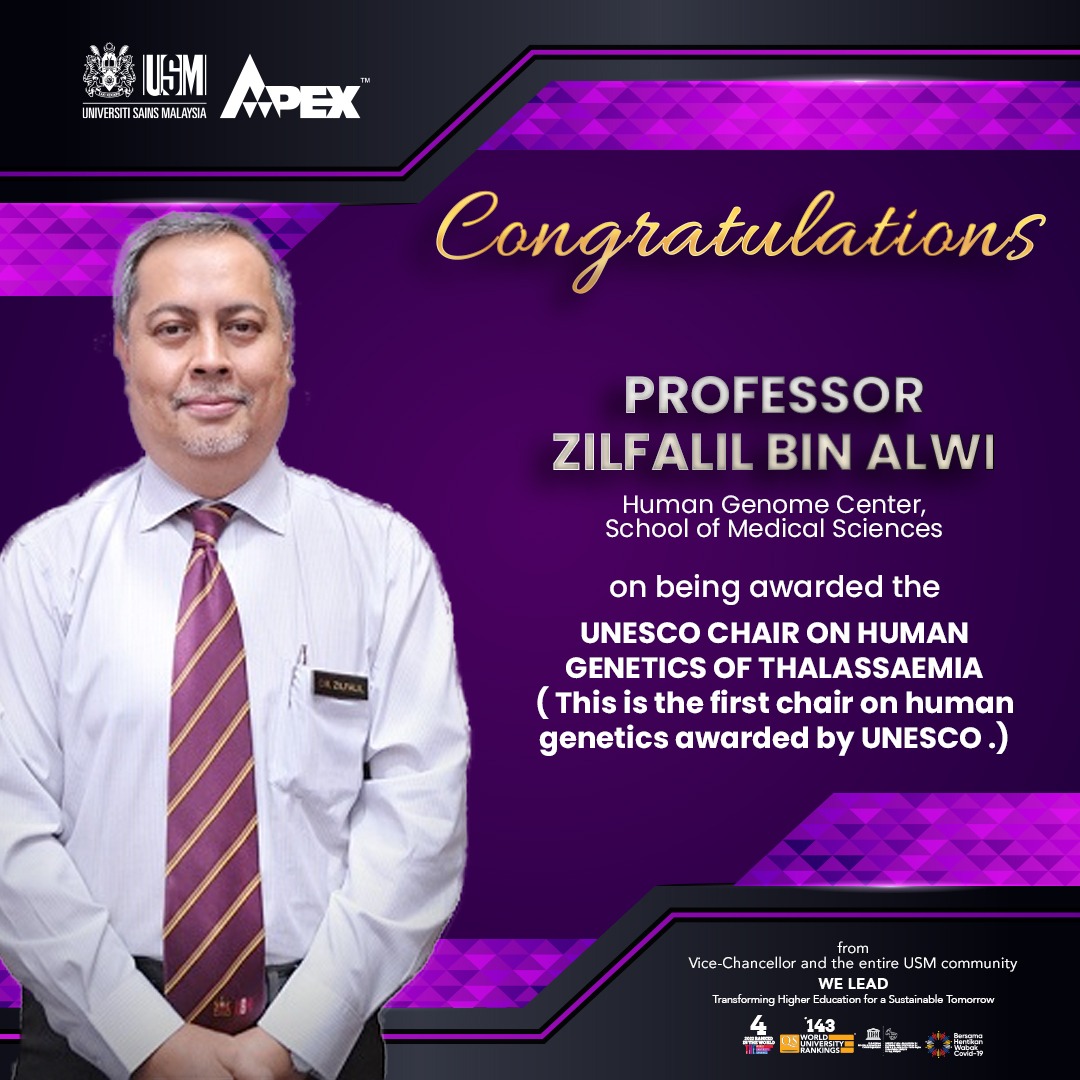USM AWARDED UNESCO CHAIR IN HUMAN GENETICS ON THALASSAEMIA
KUBANG KERIAN, KELANTAN, 4 January 2023 - The UNITWIN/UNESCO Chairs Programme was established in 1992 by the United Nations Educational, Scientific and Cultural Organization (UNESCO). This programme, which involves over 850 institutions across 117 countries, promotes international inter-university cooperation and networking to enhance institutional capacities through knowledge-sharing and collaborative work.
As of 10 October 2022, based on the list of UNESCO Chair released by UNESCO, four (4) Malaysian higher education institutions have been appointed by UNESCO to carry out this programme namely, Universiti Malaya (2016), Universiti Kebangsaan Malaysia (2019), Universiti Sains Malaysia (2020 & 2022), Asia Pacific University of Technology and Innovation, Kuala Lumpur (2022).
The UNESCO Chair in Human Genetics on Thalassaemia was awarded to Universiti Sains Malaysia (USM) in November 2022. This is the first chair in human genetics awarded by UNESCO. It will focus on human genetics with a particular reference to thalassemia, which is one of the commonest genetic diseases globally. This project will be led by Professor Dr. Zilfalil Alwi from the Human Genome Centre, USM.

A key objective of the UNESCO Chair in Human Genetics on Thalassaemia is to promote knowledge and capacity-building in human genetics among low and middle-income countries (LMIC), by taking thalassaemia as a model genetic disorder and to contribute in reducing the burden of the genetic disease.
The focus of this project is aligned to the context of Sustainable Development Goal (SDG) 3 in ensuring healthy lives and promotion of well-being for all at all ages. Thalassaemia is one of the most common genetic diseases in low and middle-income countries (LMIC). Without proper treatment, a patient with thalassaemia faces many complications, which could lead to mortality. Patients, including children, with severe thalassaemia will be prone to significant physical, psychological and social distress.
Thalassaemia is characterized by decreased haemoglobin production, either affecting the Alpha or Beta chain. At a certain level, thalassaemia will lead to severe anaemia that requires blood transfusion to sustain life.
There are two main types of thalassemia: Alpha and Beta. Different genes are affected for each type. Globally, it is estimated that there are 270 million carriers with abnormal haemoglobins, of which 80 million are carriers of Beta thalassaemia.
Several countries such as Cyprus and Singapore have successfully reduced the incidence of thalassaemia to the lowest number possible through effective antenatal screening, public health programmes and treatment.
Malaysia has conducted a nationwide thalassemia screening programme amongst 16 year-old secondary school students since 2016 to detect thalassemia carriers. One in every 20 individuals has been detected as a thalassaemia carrier in Malaysia. Previously, the state of Sabah had the highest number of affected births compared to other states in Malaysia.
However, from 2014 to 2018 new thalassaemia birth had declined steadily, especially in Sabah and this could be associated with increased public awareness due to the initiatives carried out by the government, including the screening of secondary school children.
With the decrease in the number of thalassaemia birth in Malaysia, this nationwide screening programme can be used as a model for other countries to combat thalassaemia. Hence, USM together with Universiti Kebangsaan Malaysia, Global Variome and Global Globin Network have established the Global Globin Network (GGN) which comprises of scientists, researchers and academicians from 32 countries working to combat thalassemia by applying recent developments in human genetics.
GGN consists of individuals who are from high-income countries (HIC) and LMIC. GGN is, therefore, an ideal platform for collaboration at an international level in the sharing of knowledge, technical skills and capacity building. It is hoped that this programme will be able to bridge the gap of "genomic divide" between HIC and the LMIC.
This programme is aimed at encouraging collaboration amongst students, scientists, clinicians and researchers in fields relating to human genetics in the LMIC, thereby pooling and enhancing skills and knowledge in innovative science that could lead to new discoveries. In short, it is to collaborate to embrace the new.
These activities can be implemented via collaborative expertise such as online teaching with graduate students from selected LMIC, seminar and workshop on genetics lab, visiting professorships and institutional development.
Other activities such as advocacy will also be included in this programme via the EduVariome programme, with the aim of creating awareness on the burden of genetic disease, including thalassaemia.
In conjunction with the awarding of the UNECO Chair, a professorial talk will be held soon and it will be delivered by Prof. Zilfalil Alwi. This professorial talk aims to introduce to the public the UNESCO Chair and highlight its contribution to the nation and the world.
Text: Hafiz Meah Ghouse Meah & Mazlan Hanafi Basharudin/Photo: Ebrahim Abdul Manan
- Created on .
- Hits: 1546
